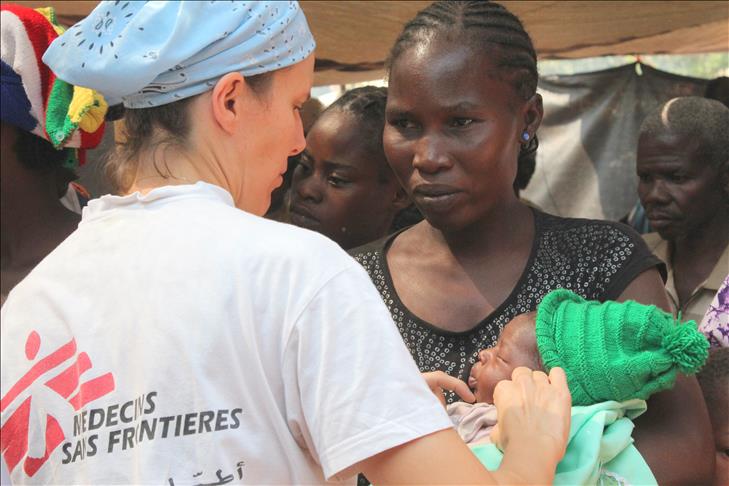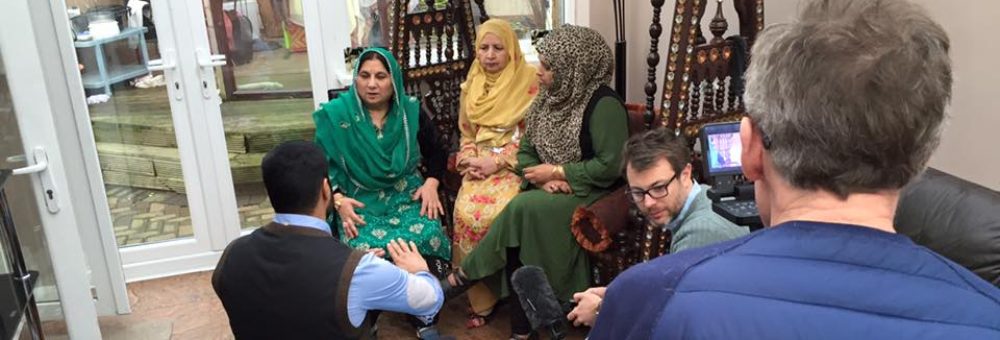Anadolu Agency (AA) Correspondent Assed Baig has travelled to the war stricken region of the Central African Republic to report on the crisis

BANGUI
In March this year Seleka Muslim rebels seized power in the majority Christian country. They removed the President Francois Bozize from power and replaced him with Michel Djotodia. The Seleka have been accused of carrying out atrocities against Christian communities. The Christian anti-Balaka or anti-machete have started to fight back, but not without being accused of atrocities of their own.
In recent weeks, the French have intervened in their former colony sending 1,600 troops to the troubled country to try and stop the violence that has ensued. 2,500 African Union troops are also in the country aiding the mission. President Djotodia has lost control of many of the rebels that brought him to power. People see him as lacking legitimacy. Although he has been trying to talk to militas of late, maybe fearing that his days in power are numbered if he cannot help bring some sort of peace to the country.
According to the United Nations Refugee Agency, 600 people were killed in violence last week. There is no real way of finding out the exact number as travelling outside of the capital is dangerous. There is still a curfew in place in Bangui.
Last week, the number of internally displaced people was 30,000, but despite the presence of French and African troops the number has increased as people still fear for their safety. They have camped at the airport where the French troops are based. They feel like it is safer. However, Médecins Sans Frontiéres (MSF) (Doctors Without Borders) workers told Anadolu Agency that there is not enough aid to meet the needs of those in the camp.
“Water, sanitation, plastic sheeting and blankets. It’s cold at night and these are only the most basic of needs,” said Cpement Chauvel.
Standing inside the camp he told Anadolu Agency, “Nothing has been distributed, take a look around for yourself.”
MSF have been working on the ground with local and international staff. They recently wrote a letter to the United Nations criticising their response to the humanitarian crisis.
“All these people want is to go back to their homes. But they can’t go back until they feel it is safe,” said coordinator for MSF, Lindis Husum.
Malaria and malnutrition is also becoming a massive problem here at the camp. It is hot and there is very little shade. People line up crammed next to each other, waiting to be seen by MSF doctors that are working flat-out to try and meet the needs of these people.
Charoline Bekaye came to the camp two weeks ago. She has her two-year-old baby with her and waits in line to be seen by a medic.
“We fled because of the war. I will return, but only when it changes,” she told Anadolu Agency. Charoline is at the camp with her six children and says that she is struggling to feed them.
Larissa Danboi gave birth in the camp two weeks ago. Her baby boy is dressed in pink. “Any baby clothes I had were destroyed when our house was burnt down, this is all I have left,” she says.
The baby doesn’t have a name yet. The family didn’t expect the baby to be born in this camp. The last two weeks of violence have forced many to come here in search of a sense of safety.
“There is an average of eight babies being born a day here at this camp,” says Husum. “We have local midwives but we need more. There is one that has come into the country today. We can’t wait to see her, she is very badly needed,” Husum tells us.
The camp is surrounded by barbed wire and security is tight. Two French troops were killed last week, something that shocked the French and the local population. There is a process of disarming taking place, but locals told me that they believe rebels have just changed into civilian clothes and are hiding their weapons.
There have also been revenge attacks on Muslims carried out by Christians. Mosques have been burnt down and Muslims murdered in the street. People want to take their own form of justice; mob violence has been a common occurrence over the last two weeks. There is a lot of resentment towards the Seleka, but this has been directed towards Muslims in the country, even if they had nothing to do with the Seleka.
Shops and businesses were open today, taxis were running and people were in the streets. The road from the airport had African Union soldiers and police standing every 100 meters or so. Soldiers with their guns at the ready and police with their riot gear stand out amongst the locals. There is a feeling here that the atmosphere could switch at any minute and that the mobs will once again take to the streets to try and dish out their own form of justice.
Read the original article published in Anadolu Agency on 16 December 2013
